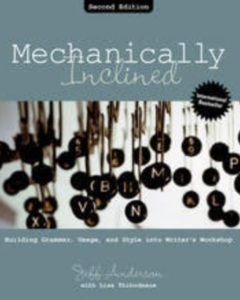Build Grammar & Usage into Writer’s Workshop
Mechanically Inclined: Building Grammar, Usage, and Style into Writer’s Workshop, 2nd edition
By Jeff Anderson with Lisa Thibodeaux
(Routledge, 2025 – Learn more)
Reviewed by Jeny Randall

If you were lucky enough to find Mechanically Inclined the first time around, this second edition offers “revised lessons, updated research, and new mentor text recommendations” (p. xii).
I was delighted to find quotes from Dave Eggers’ 2024 Newbery winner The Eyes and The Impossible included in a lesson, as well as recent research on handwriting and brain connectivity (Van der Weel and Van der Meer, 2024). Whether you’re encountering Mechanically Inclined for the first time or replacing a dog-eared copy of Anderson’s 2005 original, the second edition is worth a look.
Grammar lessons and much more

Anderson knows the busy life of a teacher, and he provides everything you need. Copy the AWWUBBIS! list of common coordinating conjunctions from the appendix, grab a copy of Jamie Lee Curtis’s When I was Little, and you’re set. The lessons can be used in progression, or you can drop in to find a specific lesson.
However, Anderson’s book offers much more: In addition to over thirty lessons on sentence structure, punctuation, and usage, Anderson lays out the ingredients for a successful recipe. He provides the context, tools, and reason for teaching grammar. He writes, “Grammar and mechanics are not rules to be mastered as much as tools to serve a writer in creating a text readers will understand” (p. 5).
Early chapters explore teaching with mentor texts, setting up writer’s notebooks, using a master editing checklist, and reaching diverse learners through repetition and visual scaffolding. Tips for timing, organization, and establishing routines make incorporating the grammar lessons feel manageable. He notes which concepts frequently appear on standardized tests and ways to differentiate for students who need extra support or for whom English is a new language.
Imagining grammar as play
“Wouldn’t it be cool if students thought of grammar and mechanics as play? If they had a ‘let’s see what this does’ attitude?” (p. 15).
In order to accomplish this, Jeff Anderson immerses students in literature. A self-proclaimed “sentence stalker” (p. 19), Anderson urges us to “flood students with elegant examples” (p. 28). From his collections, Anderson provides multiple examples of each concept drawn from a wide array of middle-grades texts, picture books, and his own reading. From Kate DiCamillo to Alan Gratz to Jason Reynolds, Anderson’s curated list of mentor sentences will appeal to students with broad interests and from diverse backgrounds.
Teachers can use the provided examples in their lessons. However, Anderson also offers guidelines for how to collect your own. For example, in lesson 6.6, “The Hyphen,” Anderson suggests that while finding examples of hyphens is fairly easy, “additional learning comes from examples where dashes and hyphens are both used in the same sentences” (p. 199).
Not only do I teach differently after reading Mechanically Inclined, I read differently. I found myself wanting to raise my hand and call him over. “Mr. Anderson! I found one, look at this sentence from The Giver: ‘Jonas never found the Ceremony of Ten particularly interesting—only time-consuming, as each child’s hair was snipped neatly into its distinguishing cut’” (Lowry, p. 59).
A master teacher at work
All this would be enough, but something else struck me about Mechanically Inclined. As I read Anderson’s lessons, ideas, and samples of conversations he’s shared with students, I knew I was observing a master teacher at work. His writing makes visualizing his classroom easy. I could hear his excitement and see students leaning in, deeply engaged with their work. Anderson’s students clearly feel safe enough to take risks, valued by seeing their writing and discoveries on the walls, and motivated to learn.
If teachers had unlimited time, I would put this book in the hands of not only middle school and high school English teachers, but any teacher who wants to observe a master educator at work: to see how he develops and consistently follows routines, how he uses multi-sensory instruction and regular review to support student mastery, and most importantly, how he builds relationships with his students.
For example, Anderson writes, “The heart of good grammar teaching is loving students’ errors” (p. 4). He unpacks the positive writing moves that lead to errors, such as identifying students’ first attempts to build more complexity into their sentences. He whole-heartedly believes that all children can learn complex material and apply it. After one student example showing how a student’s writing follows her spoken dialect, Anderson notes, “If Lynette can learn one system, she can learn the standard system as well” (p. 154).
Unfortunately, and ironically, the book is marred by a handful of typographical errors. While some are relatively minor, a few caused momentary confusion. None, however, caused me to doubt the authors and their expertise.
A balanced approach to meet today’s needs
I recognize that Writing Workshop is under fire, and some may feel reticent to engage further with it. However, having taught in the workshop model for years with late elementary and middle school students, I have seen the power of focused and intense writing instruction. A resource like Mechanically Inclined instructs teachers in creating a balanced approach to writing (and reading) instruction that leverages the best of what Writing Workshop has to offer while still providing intentional, skilled instruction in grammar, usage, and style. I’m only sorry I didn’t find Mechanically Inclined twenty years ago!
An educator for twenty years, Jeny Randall currently serves as the middle school director and language arts teacher at Saratoga Independent School in Upstate New York. Jeny is a Responsive Classroom certified teacher, who reviews regularly for MiddleWeb. School breaks find Jeny headed into the wilderness with her family and a good book.



































